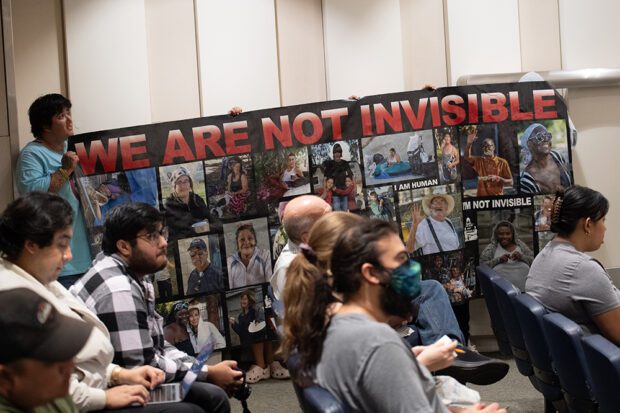
Huge Loss at the Supreme Court
On April 22, the U.S. Supreme Court heard the case of Johnson v. Grants Pass, a case challenging a long-standing Ninth Circuit Court of Appeals decision called Martin v. Boise, Idaho. The Martin decision established that those experiencing homelessness cannot be fined or jailed for camping on public property if no shelter or housing is available.
On June 28, the Supreme Court announced a 6-3 decision declaring that people experiencing homelessness can be arrested and fined for sleeping outside when there are no safe alternatives, effectively overturning Martin. In a dissenting opinion, Supreme Court Justice Sonia Sotomayor said, “Where do we put them if every city, every village, every town lacks compassion and passes a law identical to this? Where are they supposed to sleep? Are they supposed to kill themselves, not sleeping?”

Fresno First to Ban Sleeping
On Aug. 15, a harsh anti-camping ordinance that basically bans all unhoused people from being anywhere at any time in the city 24 hours a day was passed as part of the Fresno City Council’s consent calendar.
Any member of the City Council could have pulled the ordinance item from the consent calendar for possible revision and further consideration, but no one did. It passed 5 to 1.
Although Council Member Annalisa Perea made a statement that the language was “too broad” and voted against it, that was a symbolic gesture as she did not pull the item from the consent calendar. Council Members Miguel Arias, Tyler Maxwell, Nelson Esparza, Mike Karbassi and Garry Bredefeld all supported the ordinance. There were shouts of “recall” from the audience as it passed through the consent calendar approval vote process.
The ordinance codifies that “no person may sit, lie, sleep or camp in public places at any time.” The ordinance calls for arrests, fines of up to $1,000 per occurrence and jail time for up to a year, at the cost of about $100 a day, or $36,500 per year, per unhoused individual prosecuted. There will be additional, yet unknown, court and policing costs.
Ignoring Constituents and Years of Research
After two lengthy public hearings where dozens spoke in opposition and after receiving more than a hundred online and e-mail comments in opposition, the Council voted to move forward. The ordinance will be implemented on Sept. 15.
Decades of social scientific research show that the criminalization of our unhoused brothers and sisters is expensive, cruel and counterproductive. Sometimes it is deadly, for example, as when the Fresno Police Department’s Homeless Assistance Response Team (HART) sweeps seize life-saving medications or displace people to hazardous locations, such as the area around Poverello House.
As at previous Council meetings, unhoused residents of Fresno have spoken about police abuse. At the Aug. 15 meeting, Orlando, currently unhoused, said, “I’m here to address the Fresno HART and their approach towards homeless people. They are acting outside their scope of duties. They take everything from us over and over again. How can we combat that?”
Several women testified how dangerous the Poverello area is, saying that gangs and drugs are prevalent.
Constant Fear of Rape and Being Robbed
Homeless advocates have documented the consistent HART abuse and Fourth Amendment violations. Advocates have pleaded with the City to stop forcing people to move to the Poverello area, where there is rampant crime and drug dealing.
Desiree Martinez of We Are Not Invisible, an advocacy and support group for unhoused people, made a brief, but moving, statement at the Council meeting.
“I’m up here to talk about the drugs,” said Martinez. “Inside the homes and outside the homes. I’m tired of everybody blaming the homeless. So, I did some research and found some data. I want to pay respect to those that died from overdoses in Fresno.”
She then proceeded to drop one marble for each person who died into a coffee can, producing a dramatic audio effect. She used the rest of her three minutes of comment to drop 120 marbles into the can.
As many of the speakers pointed out, the ordinance leaves it to the discretion of the police to determine who to fine or arrest. Undoubtedly, common stereotypes will be used.
Sean, who is unhoused, said, “This ordinance is simply not going to work. Now I can’t be out on the sidewalk because I’m documented to be homeless. I am going to be forced to go to jail because I use services like hygiene facilities, shelter services [and] food services. Now I’m identified as being homeless.”
Apparently, the City is intent on jailing unhoused people despite knowing that it will result in criminal records and fines the arrestees can’t pay, as well as make it much harder for unhoused people to exit homelessness.
The City also knows the ordinance will be expensive. One recent study of the aftermath of local criminalization ordinances in 100 major U.S. cities concluded that the measures did not lead to a decrease in the number of people counted as homeless. The measures did, however, lead to increased court and jail costs.
Newsom’s False Outrage
“We’re done with the excuses,” said Governor Gavin Newsom. “The last big excuse was, ‘Well, the courts are saying we can’t do anything.’ Well, that’s no longer the case, so we had a simple executive order: Do your job.
“There are no more excuses. You’ve got the money (not true), you’ve got the flexibility, you’ve got the green light, you’ve got the support from the state and the public is demanding it of you.”
Standing in front of a cleared homeless encampment in Los Angeles, after holding a weird photo op holding a shovel, Newsom vowed to start taking state funding away from cities and counties that are not doing enough to move people out of encampments.
“I want to see results,” Newsom told reporters at a news conference. “I don’t want to read about them. I don’t want to see the data. I want to see it.”
Newsom’s fake outrage could be a tactic to shift blame away from him. Blame for his failure to establish oversight of and direction to establish permanent housing with huge sums of public dollars. We have exposed the lack of state oversight of more than $24 billion for the unhoused of California in our previous coverage.
The Hoover Institution recently reported that “since 2019, California has spent about $24 billion on homelessness, but in this five-year period, homelessness increased by about 30,000, to more than 181,000. Put differently, California spent the equivalent of about $160,000 per person (based on the 2019 figure) over the last five years. With this level of spending, it was reasonable to expect that homelessness would decline substantially. What went wrong?”
The report continues: “There are three major problems with California’s homelessness policies that are facilitating this increase. One problem is a significant lack of oversight and information about homelessness spending. The state auditor recently evaluated this spending and submitted a report that highlights the failure of the state to track spending and outcomes.”
Governor Newsom is to blame for this fiasco. The governor was urged to begin auditing homeless service providers in 2017. He did not. The governor’s latest directive to sweep all encampments in California is a recommendation, not an order, after years of his mismanagement. Both the city and county of Los Angeles are rejecting Newsom’s directive.
“Just by sweeping people off the streets [and] off sidewalks and putting them in jail is not going to settle this issue,” Los Angeles County Supervisor Hilda Solis said at a recent press conference.
Los Angeles Mayor Karen Bass also condemned Newsom saying that “removing encampments would criminalize homeless people without getting to the root problem of homelessness.”
Fresno First (To Bully)
The City and County of Fresno are the first in the nation to implement such a harsh anti-camping ordinance. Despite overwhelming opposition, Fresno County is moving forward after giving unanimous approval at a first reading of a similar ordinance. It passed unanimously on Aug. 20. County and city politicians are implementing ordinances that bully and over-police the elderly (more than half of those on the streets are 50 or older) and the poorest of the poor.
These morally bankrupt “leaders” are attacking the most vulnerable human beings in the city and county. They claim they represent the small business community and that business owners are complaining about too many unhoused residents near their businesses.
Several of those attending the Aug. 15 Council meeting pointed out that past and current City policy of breaking up encampments on the outskirts of town has been the main factor in the influx of unhoused folks into shopping centers and near business areas throughout Fresno.
Understandably, business owners and residents have legitimate concerns, such as open drug use near their businesses and homes. Incarceration is not the answer.
Manuel Torres of the Leadership Council for Justice and Accountability says that “the ordinance is not a solution. The City and County should focus on providing [more] mental health services and open [more] detox centers.”
Instead of establishing safe camps, safe lots and tiny home villages, it appears plans are being made to jail people. As soon as the Council approved the anti-camping ordinance, it went into a closed session to discuss the use of a facility currently owned by the County to jail unhoused people.
Council Member Arias brought forward a proposal to use the abandoned Elkhorn Correctional Facility near Caruthers, 15 miles south of Fresno and currently owned by Fresno County, to incarcerate poor people.
Although Fresno County Sheriff John Zanoni has stated publicly that “we don’t want to arrest [unhoused] people,” the Fresno County Sheriff’s Office has said that “arrests are a last resort, but we will take that initiative if needed.”
Was White, of the Monterey/Salinas County Homeless Union, told the City Council, “You’re all domestic terrorists if this passes. What are you going to do, bury them alive? People still have inalienable rights, the right to life, liberty and the pursuit of happiness. [Yet, they] are denied food, clothing, shelter, running water and electricity.
“Even in the Steinbeck days [the Great Depression], the government offered housing and running water. Nowadays, it’s just getting out. You’re not allowed anything. You’re going to cite them and put them in jail!”
Another speaker, James, said, “it seems to me that you are putting up a facade, like you’re doing something about it, but you are just perpetuating it. I’m here because I care about people, and you should too.” Any normal human being would care.
Take Action!
Contact Fresno’s mayor, the Fresno City Council members and the County supervisors. Tell them to quit punishing poor people and to stop scapegoating and abusing such a small segment of our population. Tell them to provide less costly solutions to the housing crisis such as the establishment of safe camps and tiny home villages.
